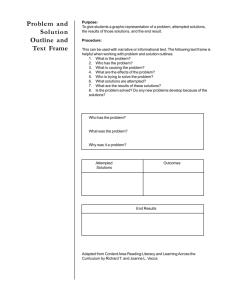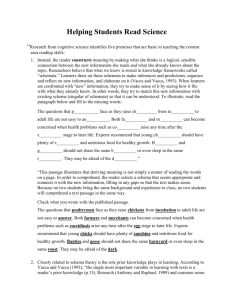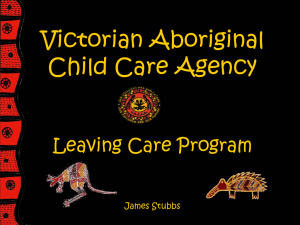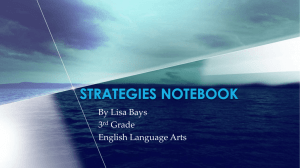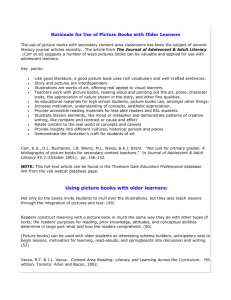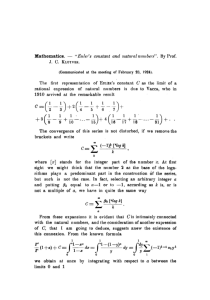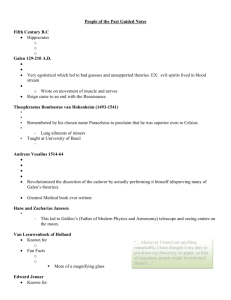CRD 412 - WordPress.com
advertisement
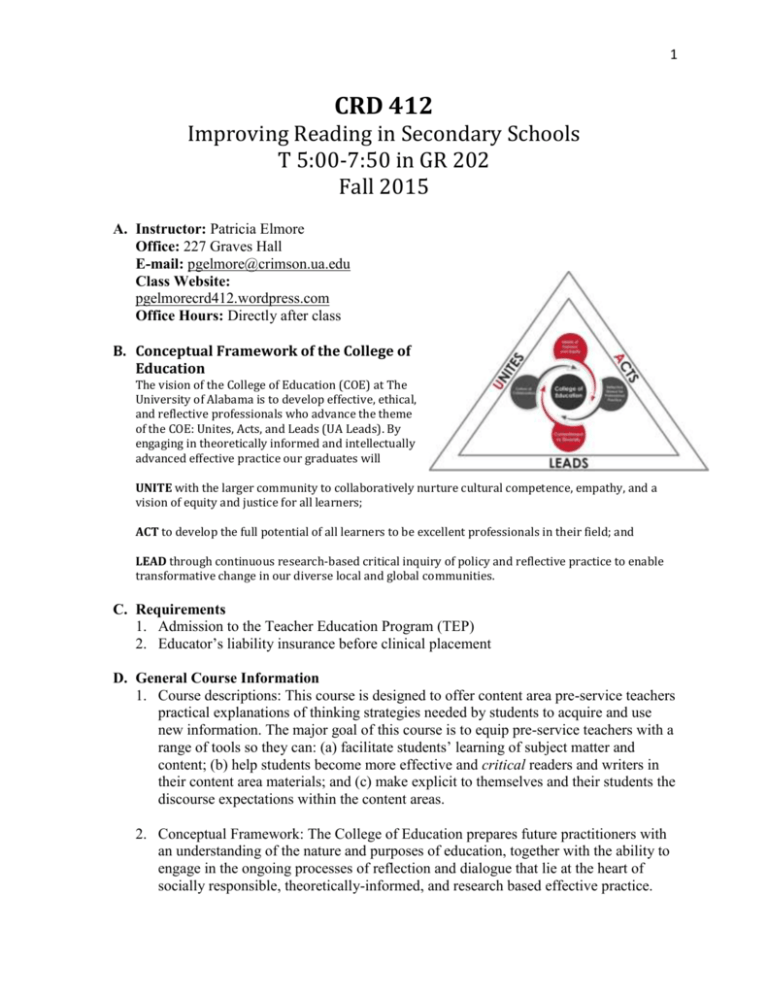
1 CRD 412 Improving Reading in Secondary Schools T 5:00-7:50 in GR 202 Fall 2015 A. Instructor: Patricia Elmore Office: 227 Graves Hall E-mail: pgelmore@crimson.ua.edu Class Website: pgelmorecrd412.wordpress.com Office Hours: Directly after class B. Conceptual Framework of the College of Education The vision of the College of Education (COE) at The University of Alabama is to develop effective, ethical, and reflective professionals who advance the theme of the COE: Unites, Acts, and Leads (UA Leads). By engaging in theoretically informed and intellectually advanced effective practice our graduates will UNITE with the larger community to collaboratively nurture cultural competence, empathy, and a vision of equity and justice for all learners; ACT to develop the full potential of all learners to be excellent professionals in their field; and LEAD through continuous research-based critical inquiry of policy and reflective practice to enable transformative change in our diverse local and global communities. C. Requirements 1. Admission to the Teacher Education Program (TEP) 2. Educator’s liability insurance before clinical placement D. General Course Information 1. Course descriptions: This course is designed to offer content area pre-service teachers practical explanations of thinking strategies needed by students to acquire and use new information. The major goal of this course is to equip pre-service teachers with a range of tools so they can: (a) facilitate students’ learning of subject matter and content; (b) help students become more effective and critical readers and writers in their content area materials; and (c) make explicit to themselves and their students the discourse expectations within the content areas. 2. Conceptual Framework: The College of Education prepares future practitioners with an understanding of the nature and purposes of education, together with the ability to engage in the ongoing processes of reflection and dialogue that lie at the heart of socially responsible, theoretically-informed, and research based effective practice. 2 3. Knowledge Base: Current research-based information about students and the recommended practices for teaching at the middle and secondary levels are examined throughout the course. Students use textbooks, journal articles, technology, and classroom experiences to increase their personal knowledge of instructional practice. Emphasis is placed on selection of appropriate teaching strategies and ways to implement recommended practices. Professional behavior that includes ways to establish and maintain learning environments and the need for ethical decision making are addressed throughout the course. 4. Course Designation: CRD 412 is a designated writing (W) course for the University of Alabama’s core curriculum; therefore, satisfactorily completing writing assignments is required for a student to receive a passing grade in this course. A student who does not write with the skill normally required of an upper division student will not earn a passing grade. E. Course Objectives and Student Outcomes: All standards must be met to obtain a passing grade for this class. The following coded objectives are generated from the state rules, 290-3-3-.04 Professional Studies, Basic Programs. Students will: 1. Demonstrate the ability to create a print/language-rich environment that develops/extends students’ desire and ability to read, write, speak, and listen [(2)(c)3.(vii)]. 2. Demonstrate the ability to model appropriate oral and written communication [(2)(c)1.(iv)]. 3. Demonstrate the ability to integrate skill development in oral and written communications into all content areas that one teaches [(2)(c)1.(vii)]. 4. Demonstrate the knowledge of strategies associated with accelerated, highly specialized, explicit instruction in phonemic awareness, phonics, fluency, vocabulary, and comprehension that significantly expands and increases students’ pace of learning and competence in reading, writing, speaking, and listening [(3)(c)2.(i)]. 5. Demonstrate the knowledge of assessment tools to monitor the acquisition of reading strategies, to improve reading instruction, and to identify students who require additional instruction [(3)(c)2.(ii)]. 6. Demonstrate the ability to integrate reading instruction into all content areas that one teaches [(3)(c)2.(iii)]. 7. Demonstrate the ability to stimulate interest in and foster appreciation for the written word, promote reading growth, and increase the motivation of students to read widely and independently for information and pleasure [(3)(c)2.(iv)]. 8. With regard to technology, students will demonstrate the ability to design, implement, and assess learner-centered lessons and units that use appropriate and effective practices in teaching and learning with technology. 9. Demonstrate knowledge of group discussion and the role of communication in resolving conflicts [290-3-3-.10 (1)(a)6]. 10. Use peer and teacher conferencing and rubric assessment to help students edit and revise their writing [290-3-3-.10 (1)(b)13]. 3 11. Teach students to apply discipline-specific reading and writing strategies in all content areas [290-3-3-.10 (1)(b)14]. 12. Select appropriate research-based strategies and materials to meet the needs of struggling readers [290-3-3-.10 (1)(b)15]. 13. Demonstrate knowledge of the writing process, including the stages of prewriting, drafting, revising, editing, and publishing [290-3-.10 (1) (a) 2]. 14. Use inquiry-based learning and critical literacy practices in your lessons. E. Required Course Textbook: Vacca, Vacca, & Mraz (2014). Content area reading: Literacy and learning across the curriculum (11th ed.). ISBN 0-13-306678-9. F. Additional Resources: 1. Alabama Common Core Course of Study (to be handed out in class) 2. LiveText (available at the Supe Store) 3. APA Style Guide: http://owl.english.purdue.edu/handouts/research/r_apa.html 4. **Additional readings will be handed out in class and available on the course website. G. Attendance, Assignment Policy, and Make-Up Policy: Full and active attendance is expected. This class is scheduled to meet 14 times. You are allowed 1 absence from class without your absence affecting your final grade. If you miss 2 classes, your final grade will be docked ½ a letter; 3 classes, 1 letter, and so forth. Additionally, you will lose 7 participation points for every day missed depending on the activities, discussions etc. that you missed. Participation points for missed classes cannot be made up. Extra credit for this course is not optional. Assignments are due at the date and time for which they are listed on the syllabus. Late assignments will lose ½ of a letter grade for each day late (including weekends and holidays). Assignments turned in more than 1 week late will not earn points, but I will give you feedback. It is impossible to make up classwork assignments that are over a week late. Extra credit for this course is not optional. H. Academic Misconduct and Plagiarism: Academic misconduct by students includes all acts of dishonesty in any academically related matter and any knowing or intentional help or attempt to help, or conspiracy to help, another student commit an act of academic dishonesty. The Academic Misconduct Disciplinary Policy will be followed in the event of academic misconduct. Plagiarism is the act of representing words, data, works, ideas, computer programs or output, or other material not generated by the student as his or her own. Plagiarism may be inadvertent or purposeful; however, plagiarism is not a question of intent. All suspected incidences of plagiarism must be reported by the course instructor to the Assistant Dean of the College of Education. Plagiarism is a serious act of academic misconduct and may result in a student’s receiving an “F” in the course and being suspended form the University. For more information, refer to http://registrar.ua.edu/policies/ I. Statement of Equal Treatment and Disabilities: If you are a person with a disability and desire accommodations to complete course requirements, please notify the course instructor in writing as soon as possible to discuss 4 your request. If you are registered with the Office of Disability Services, please make an appointment with the instructor as soon as possible to discuss any course accommodations that may be necessary. If you have a disability but have not contacted the Office of Disability Services, please call 348-5175 or visit Osband Hall to register for services. J. Classroom Decorum: 1. The Code of Student Conduct requires that students behave in a manner that is conducive to a teaching/learning environment. Students who engage in disruptive behavior will be subject to disciplinary sanctions outlined by the Code of Student Conduct. Disruptive/obstructive behavior is not limited to but may include the following: verbal abuse, threats, stalking, intimidation, and harassment. 2. I require that students act in a manner conducive to serious, rigorous inquiry. It is a great responsibility to facilitate students in middle schools and high schools; therefore, you must carry a professional disposition in this classroom and in the schools at all times. Be generous in your observations of your cooperating teacher, as someday you will be in their shoes. This doesn’t mean you shouldn’t be critically reflective. Leave your teacher’s name and your students’ names out of discussions/writing (they deserve privacy). K. Evaluation of Objectives/Grade Determination: Assignment Due Date Pts 1.Full and Active Participation* August 25th (9 points) Other Days (7 points each) Ongoing 100 (2)(c)1.(iv) 290-3-3-.10(1)(b)14 290-3-3/10(1)(b)15 290-3-3.10(1)(a)6 2. Workshops Content-area specific workshops that will occur during the last hour of class. An independent assignment will be provided for content-areas not participating in the workshop. (15 points each) 09/01 – SELA 09/08 – Music 09/15 – SESS 09/22 – SELA 09/29 – Music 10/06 – SESS 90 (2)(c)3.(vii) (2)(c)1.(iv) (2)(c)1.(vii) (3)(c)2.(ii) (3)(c)2.(iii) (3)(c)2.(iv) 290-3-3-.10 (1)(a)6 290-3-3-.10 (1)(b)13 290-3-3-.10 (1)(b)14 290-3-3-.10 (1)(b)15 290-3-.10 (1) (a) 2 3. Lesson Plan Practice Ten content-area literacy lesson plans that will be created and sometimes presented in-class (10 points each) 09/01 - LPP1 09/08 - LPP2 09/15 - LPP3 09/22 - LPP4 09/29 - LPP5 10/06 - LPP6 11/03 - LPP7 11/10 - LPP8 11/17 - LPP9 12/01 - LPP10 100 (2)(c)3.(vii) (2)(c)1.(iv) (2)(c)1.(vii) (3)(c)2.(ii) (3)(c)2.(iii) (3)(c)2.(iv) 290-3-3-.10 (1)(a)6 290-3-3-.10 (1)(b)13 290-3-3-.10 (1)(b)14 290-3-3-.10 (1)(b)15 290-3-.10 (1) (a) 2 (3)(c)2.(i) 5 10/10 - Rich description due via email by midnight 10/13 - Lesson plan due via email by midnight. Can be a Rough draft. Enacted (as feasible) One page reflection (as feasible) Evaluated (as feasible) 11/30 - All scanned together AS ONE FILE and uploaded AS ONE FILE to LiveText by midnight 110 5. Reading Responses Directions for each reading assignment will be handed out beforehand in class. Reading responses are due in-class on the date they are listed on the syllabus. 09/01 - RR1 09/08 - RR2 09/15 - RR3 09/22 - RR4 09/29 - RR5 10/06 - RR6 11/03 - RR7 11/10 - RR8 11/17 – RR9 12/01 - RR10 100 (2)(c)3.(vii) (2)(c)1.(iv) (2)(c)1.(vii) (3)(c)2.(ii) (3)(c)2.(iii) (3)(c)2.(iv) 6. Argumentative Paper Outline (10) 1st draft (20) 2nd draft (20) Final draft (50) 10/13 – Outline to be done in class 10/20 – 1st draft due in class (4 pages min.) 10/22 – 2nd draft due via email by midnight (8 pages min.) 10/31 – Final draft due via email by midnight (8 pages min.) 100 290-3-.10 (1) (a) 2 (2)(c)1.(iv) (2)(c)1.(vii) (2)(c)1.(vii) 290-3-3-.10 (1)(b)13 7. BDA Resource Folder 11/17– bring completed folder to class 100 (3)(c)2.(ii) (3)(c)2.(iii) 290-3-3-.10 (1)(b)14 290-3-3-.10 (1)(b)15 12/06 – due via email by midnight 200 (2)(c)3.(vii) (2)(c)1.(iv) (2)(c)1.(vii) (3)(c)2.(iii) (3)(c)2.(iv) 290-3-3-.10 (1)(a)6 290-3-3-.10 (1)(b)14 290-3-3-.10 (1)(b)15 4. Clinical Experience Assignment 1) Rich Description (10 points) 2) Lesson Plan that is either technology-infused, critical literacy, or inquiry-based (50 points) 3) Enacted (20 points) 4) One page reflection (20 points) 5) Mentor teacher’s evaluation (10 points) 5 Before Strategies (5) 5 During Strategies (5) 5 After Strategies (5) Descriptions (15) Rationales (30) Organization/Neatness (10) Blank Copies (15) Completed Examples (15) 8. Unit Plan (3)(c)2.(i) (3)(c)2.(iii) (3)(c)2.(iv) (2)(c)3.(vii) Total Points /900 ** It is conceivable that unannounced mini-quizzes and in-class writings will be added (at my discretion), which will result in more total points for this class. 6 How All Written Work will be Graded: 1. Written work will be evaluated on the basis of clearly articulated understandings of course concepts and their application, adherence to assignment/test guidelines, usefulness in secondary teaching, careful incorporation of literacy research and theoretical perspectives discussed in class, and by the 6 + 1 Traits (Ideas, Organization, Voice, Word Choice, Sentence Fluency, Conventions, and Presentation). Writing rubrics will be provided. 2. All papers submitted must be revised and edited. Students are advised to have a peer or peers read their papers before submitting them to the instructor. The quality of the content and writing will always be the focus of the instructor during scoring, but papers are also expected to be proofread and well-edited. 3. A papers will be exceptional in all areas. B papers will meet the requirements. C papers will show clear weaknesses in one area. D papers will show clear weaknesses in two areas. F papers will show weaknesses in many areas. Grading Scale: A+ 97-100% A 94-96% A90-93% B+ B B- 87-89% 84-86% 80-83% C+ C C- 77-79% 74-76% 70-73% L. Description of Assignments: 1. Full and Active Participation: (100 total possible points) Class participation means assuming your share of the responsibility for making our class productive, professional and engaging. Full and active attendance is expected. You are to read all assignments prior to the date they are scheduled to be discussed. Meaningful participation includes attendance, completion of all-in class activities, participating in discussions, etc. Point deduction occurs with the following behaviors: absences; coming unprepared by apparent lack of questions, comments, insights; checking e-mail, text messages, Facebook and/or Twitter/social networking during class; failing to contribute to group work assigned. Your participation will be graded holistically at the end of each class. Rubric for In-Class Participation (14 @ 7 points each = 98 possible points + 2 first day points = 100 points) Points Description 7 Exhibits both of the following: present the whole time (physically, mentally, emotionally, technologically); active contributions to all whole group, small group, and individual activities. 4-6 Exhibits one of the following: late to class or early release from class; non-contributing during whole group, small group, or individual activities; e-mailing, texting, tweeting, crossword puzzling; unprofessional behavior (e.g. rudeness, making fun of others, sleeping, and so forth). 0-3 Is absent or exhibits more than one of the following: late to class or early release from class; non-contributing during whole group, small group, or individual activities; emailing, texting, tweeting, crossword puzzling, newspapers, etc. 7 2. Workshops: (90 possible points) Over the course of the semester, we will have six content-area workshops. One content-area group will remain in class for a workshop specific to their content-area while the other contentarea groups complete an independent assignment. Rubric for Workshop Participation (6 @ 15 points each = 90 possible points) Points Description 15 Writing is on topic, demonstrates thoughtfulness, organized, and contains no grammatical, spelling, or mechanical errors. The assignment is turned in on time. The writer uses complete sentences. Exhibits both of the following: present the whole time (physically, mentally, emotionally, technologically); active contributions to all whole group, small group, and individual activities. 8-14 Writing is organized and on topic, but contains one to two grammatical, spelling, or mechanical errors. The writer uses complete sentences. Exhibits one of the following: late to class or early release from class; non-contributing during whole group, small group, or individual activities; e-mailing, texting, tweeting, crossword puzzling; unprofessional behavior (e.g. rudeness, making fun of others, sleeping, and so forth). 0-7 Assignment is not completed or incomplete. The writing lacks coherence or has several grammatical, spelling, or mechanical errors. The writer does not use complete sentences. Is absent or exhibits more than one of the following: late to class or early release from class; non-contributing during whole group, small group, or individual activities; e-mailing, texting, tweeting, crossword puzzling, news papers, etc. 3. Lesson Plan Practice: (100 possible points) Over the course of the semester, you will create and sometimes present 10 literacy lesson plans that utilize the Common Core reading standards for your content area. These lesson plans will be created in class (sometimes individually and other times in small groups). The emphasis of these lessons should be on reading skills and comprehension in your content area. This means you are not focused so much on the topic of discussion (for example, WWII) but on teaching students reading comprehension skills such as tackling unfamiliar words, main idea, self-monitoring etc. An example and the rubric are available on our class website: https://pgelmorecrd412.wordpress.com/discussionactivity-leader/ 4. Clinical Experience Assignment: (110 possible points) The clinical experience component of this course is designed to enable students enrolled in CRD 412 to observe secondary students as they engage in literacy experiences in the content areas. This 10-hour placement is in addition to your 90+ Methods hours. Detailed Instructions, Examples, Resources, and Rubrics available on our class website: https://pgelmorecrd412.wordpress.com/clinical-experiences-project/ Rich Description (due via email October 10th) Literacy Lesson Plan (due via email October 13th) – This can be a rough draft. Enact Lesson Plan (as feasible) Placement Teacher Evaluation of Enacted Lesson (as feasible) One Page Reflection on the Experience (as feasible) Upload ALL of the above as ONE single file to LiveText (due via email by midnight, November 30th) 8 5. Reading Responses: (100 possible points) Over the course of the semester, you will be assigned several reading assignments. For ten of these, you will complete brief reading responses. Rubric for Reading Response Participation (10 @ 10 points each = 100 possible points) Points 10 6-9 0-5 Description Writing is on topic, demonstrates thoughtfulness, organized, and contains no grammatical, spelling, or mechanical errors. The assignment is turned in on time. The writer uses complete sentences. Writing is organized and on topic, but contains one to two grammatical, spelling, or mechanical errors. The writer uses complete sentences. Assignment is not completed or incomplete. The writing lacks coherence or has several grammatical, spelling, or mechanical errors. The writer does not use complete sentences. 6. Argumentative Essay: (100 possible points) The argumentative essay will present and support an argument concerning literacy and your content-area. This paper should be no longer than 10 pages, (but preferably 8). Please doublespace and use APA or MLA format, 1” margins all around, and Times New Roman font 12. We will also use this assignment in our discussion of ways to teach writing in the disciplines. In addition, you will practice grading and giving feedback on written assignments as we work on the essay. An example and rubric, see our class website: https://pgelmorecrd412.wordpress.com/argumentative-essay/ Outline (10 points) will be done during class on October 13th First Draft (20 points) 4 pages minimum due in class October 20th Second Draft (20 points) 8 pages minimum by midnight via email October 22nd Final Draft (50 points) 8-10 pages due by midnight via email October 31st 7. BDA Resource Folder: (100 possible points) A rubric is available via our class website: https://pgelmorecrd412.wordpress.com/bda-resourcefolder/ 8. Unit Plan: (200 possible points) For this project you will create a unit plan for your future classroom that emphasizes reading skills and uses the Common Core Reading Standards for your content area. Your unit plan can be 10 days long (ten 45 minute lesson plans) OR 5 days long (five 90 minute lesson plans). You may incorporate materials from other assignments in this class or other classes that you have created. If you do, be sure to adapt the materials to fit the requirements of this assignment. ALSO, I will be assigning "considerations" that you will use to write the Accommodations portion of your lessons. Due via email by midnight December 6th. See our class website for an example unit plan, the unit plan format, considerations, and a rubric: https://pgelmorecrd412.wordpress.com/unit-plan/ 9 Fall 2015 Semester Schedule Date Readings Due Assignments Due Topics AUGUST 8/25 Please acquire a copy of the class textbook ASAP. 1) Literacy Interview (in-class) 1) Syllabus & Class Overview 2) Classroom Environment 3) Illiteracy SEPTEMBER 9/01 1) Teachers and content area reading: Attitudes, beliefs and change (Hall, 2004) 1) RR1 due in class. Complete a 3-21 for Hall (2004) 2) LPP 1 (in-class) 3) Independent Work for SESS & Music: Watch http://www.youtube.com/watch?v=G 7bGv7LPL4Y and complete a T-Chart listing positive and negative moves the teacher makes (to be done in class; due 1) New Teachers 2) The Common Core 3) Lesson Plan Practice #1 4) SELA Teachers Workshop: Incorporating Grammar and Spelling into Literacy Lessons by midnight via email or you can return to class and hand it in) 9/08 1) Chapter 5 (pp. 132-168) Vacca, Vacca, & Mraz (2014) 2) Chapter 7 (pp. 198-235) Vacca, Vacca, & Mraz (2014) 1) RR2 due in class. Complete 1 Observation, 1 Connection, 1 Surprise, & 1 Question for the readings. 2) LPP 2 (in-class) 3) Independent Work: SELA: Watch http://www.youtube.com/watch?v=G 7bGv7LPL4Y and complete a T-Chart listing positive and negative moves the teacher makes (to be done in class; due by 8PM via email or by hand). SESS: Read Disciplinary literacy in the history classroom (Ravi, 2012) and complete a 3-2-1 (to be completed in class; due by 8PM via email or by hand) 1) The Core Purposes of Reading 2) Writing Learning Objectives 3) Building Literacy Lessons (Including BDA, TWIRL, & Explicit Instruction) 4) Lesson Plan Practice #2 5) Music Teachers Workshop: Strategies to Incorporate Reading into Music-Centric Classrooms 10 9/15 1) Chapter 1 (pp. 2-26) Vacca, Vacca, & Mraz (2014) 2) The reading turn-around: A five-part framework for differentiated instruction (Jones, Clarke, & Enriquez, 2011) 3) Mentoring students in disciplinary literacy (Buehl, 2011) 9/22 1) Chapter 10 (pp. 310-340) Vacca, Vacca, & Mraz (2014) 1) RR3 due in class. Use the assigned readings to discuss the concepts of disciplinary literacy and differentiated instruction. 2) LPP3 (in-class) 3) Independent Work for SELA and Music: Watch https://www.youtube.com/watch?v=k m7X5kQYOg8 clip and complete an Exit Slip (to be 1) How Smart Readers Think 2) Strategies to Build or Tap Into Prior Knowledge 3) Lesson Plan Practice #3 4) SESS Teachers Workshop: Reading Strategies Specific to Social Studies Classrooms completed in class; due by 8PM via email or you can return to class and hand it in) Exit Slip: Which pieces of advice do you agree with the most? The least? Explain. 1) RR4 due in class. Create a T-Chart that demonstrates the internal vs external structures of Ch. 10 (Vacca, Vacca, & Mraz, 2014) 2) LPP4 (in-class) 3) Independent Work: SESS: Watch https://www.youtube.com/watch?v=k m7X5kQYOg8 clip and complete an Exit Slip (to be completed in class; due by 8PM via email or you can return to class and hand it in) Exit Slip: Which piece of advice do you agree with the most? The least? Explain. Music: Read Literacy skills in music class: Tool for pre-service teacher growth (Feret & Smith, 2010) and complete an 3-2-1 (to be completed in class; due by 8PM via email or by hand) 1) How to Use a Textbook 2) Strategic Supplementing 3) McClure Visit – Bring your ACTcard. 4) Lesson Plan Practice #4 5) SELA Teachers Workshop: Poetry, Plays, and Creative Writing 11 9/29 1) Chapter 3 (pp. 58-90) Vacca, Vacca, & Mraz (2014) 2) Preparing for culturally responsive teaching (Gay, 2002) 3) Chapter 6 (pp. 172-196) Vacca, Vacca, & Mraz (2014) 1) RR5 due in class. Complete 1 Observation, 1 Connection, 1 Surprise, & 1 Question for the readings 2) LPP5 (in-class) 3) Independent Work for SELA & SESS: Watch https://www.youtube.com/watch?v=J lQg5Km2n7I clip and respond with a RAFT from the perspective of one of the students in the classroom (to be completed in 1) Struggling and Disengaged Readers: Identifying, Engaging, Accommodating 2) Culturally and Linguistically Responsive Pedagogy 3) Students with Special Needs 4) RTI 5) Lesson Plan Practice #5 6) Music Teachers Workshop: Planning a Literacy Lesson for Music class; due by 8PM via email) OCTOBER 10/06 1) Chapter 8 (pp. 238-269) Vacca, Vacca, & Mraz (2014) 1) RR6 due in class. Complete a 3-21 for Ch. 8 of Vacca, Vacca, & Mraz (2014). 2) LPP6 (in-class) 3) Independent Work for Music: Watch https://www.youtube.com/watch?v=J lQg5Km2n7I clip and respond with a RAFT from the perspective of one of the students in the classroom (to be 1) Meaningful Vocabulary 2) Lesson Plan Practice #6 3) Clinical Experiences Project Workshop (all content-areas) 4) SESS and SELA Teachers Workshop: Supplementing the Textbook and Cross-Curricular Units/Lesson Planning completed in class; due by 8PM via email) 10/10 THIS IS NOT A CLASS MEETING 10/13 1) Chapter 9 (pp. 280-307) Vacca, Vacca, & Mraz (2014) 1) Clinical Experiences Project Lesson Plan due via email by midnight 2) Argumentative Essay Outline (to be created during class) 1) Teaching Writing Skills in the Content Areas 2) The Writing Process/6+1 Traits 3) Research Papers & Argumentative Essays 4) Brainstorming, Outlining, and First Draft Rules 5) Incorporating Debate 10/20 1) Chapter 7 (pp. 198-235) Vacca, Vacca, 1) Argumentative Essay 1st draft (4 pages min.) due in-class 1) Evaluating Student Writing/Giving Quality Feedback 1) Clinical Experiences Project Rich Description due via email by midnight 12 & Mraz (2014) 10/22 THIS IS NOT A CLASS MEETING 10/27 1) Chapter 2 (pp. 30-31; 3349; Figure 2.6 p.. 50 Vacca, Vacca, & Mraz (2014) 10/31 THIS IS NOT A CLASS MEETING 2) Other Types of Classroom Writing 3) In-Class Writing Workshop 4) Guided Reading Comprehension 1) Argumentative Essay 2nd draft (8 pages min.) due by midnight via email 1) Meaningful Multimedia 2) Incorporating Technology into Literacy Lessons 3) Other Classroom Uses for Technology 4) Gamified Classrooms 1) Argumentative Essay final draft (8 pages min.) due by midnight via email NOVEMBER 11/03 1) Chapter 11 (pp. 344-345; 365-374; 377380) Vacca, Vacca, & Mraz (2014 1) RR7 due in class. Complete a 3-21 for Ch. 11 of Vacca, Vacca, & Mraz (2014). 2) LPP7 (in-class) 1) Creating Literacy Text Sets and Unit Plans 2) Class Libraries & Book Clubs 3) Meaningful Novels 4) Lesson Plan Practice #7 11/10 1) Chapter 4 (pp. 94-125) Vacca, Vacca, & Mraz (2014 1) RR8 due in class. Directions will be given beforehand. 2) LPP8 (in-class) 1) Assessment, Rubrics, Accelerated Reading, and other Formal and Informal Measurements of Reading Ability 2) Lesson Plan Practice #8 1) RR9 due in class. Directions will be given beforehand. 2) LPP9 (in-class) 3) BDA Resource Folder due in class 1) Close Reading 2) Meaningful Incorporation of Strategies Practice 3) Lesson Plan Practice #9 11/17 11/24 Thanksgiving NO CLASS Use this time to work on your Clinical Experiences Project and Unit Plans 13 11/30 THIS IS NOT A CLASS MEETING 1) Clinical Experiences Project must be scanned together and uploaded to LiveText AS ONE FILE by midnight DECEMBER 12/01 1) Literacies in 1) RR10 due in class. Complete a 3the body (Jones, 2-1 for Jones (2013) & Spector 2013) (2015). 2) LPP10 (in-class) 2) Meeting pedagogical encounters halfway (Spector, 2015) 12/06 THIS IS NOT A CLASS MEETING 1) Lesson Plan Practice #10 2) Semester Wrap-Up 1) Unit Plans due via email by midnight **If you would like to request a workshop in a specific area, feel free! We can incorporate additional workshops beginning in October.
